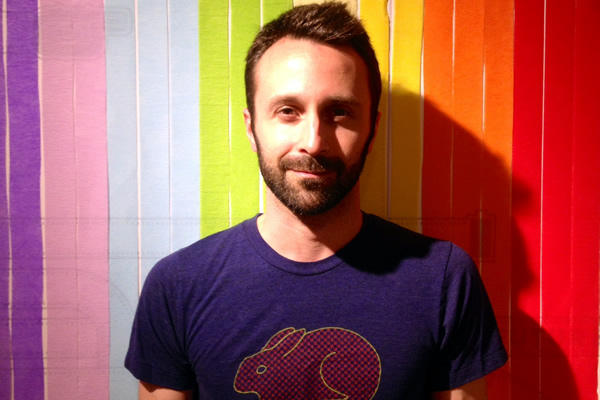Sports
Swimming against the tide
Pioneer athlete Evan Cobb recalls college career


Evan Cobb came out as a varsity swimmer at Oberlin College years before it was trendy. (Photo courtesy Cobb)
The LGBT sports movement has gained a lot of steam over the past few years. With diversity training and support coming from athlete outreach programs such as Changing the Game, Athlete Ally, You Can Play and Go! Athletes, the evolution of accepting an out athlete into a team situation has progressed rapidly.
A lot of the new dynamic has been accomplished through the changing attitudes in sports leadership. Coaches, athletic directors and sports team managers are feeling the social responsibility to create safe environments for their athletes.
The result of these changes is that more athletes are starting to come out, but we wouldn’t be where we are now without the athletes who stepped forward in the past.
In the collegiate setting, one of the early athlete pioneers was Evan Cobb, a varsity swimmer from Oberlin College who voluntarily came out during the first few months of his freshman year in 1997.
Cobb, from Fredonia, N.Y., was directed to the small liberal arts college in Ohio by an aunt who was involved with the Conservatory of Music at Oberlin. She believed that the left- leaning countercultural atmosphere of the campus would offer Cobb the opportunity to thrive.
His aunt was right about the vibe on the Oberlin campus and Cobb decided to come out to his coach, Dick Michaels, in October of 1997.
“I knew it was going to be tough,” Cobb says. “When I walked into his office, he looked up at me and said, ‘You have been missing practices. What’s up?’”
Cobb went on to have a positive athletic college experience and still thinks of Michaels as one of the most important mentors in his life. What he didn’t know at the time was that Michaels’ own son had come out just a few days earlier.
A year later, in Cobb’s sophomore year, Michael Muska was hired as athletic director at Oberlin College and was quickly outed by the Chronicle of Higher Education. It is believed that Muska was the first openly gay athletic director in a collegiate setting.
Westboro Baptist Church threatened to protest at the college but once again the tradition of openness and tolerance at Oberlin prevailed as the college stood behind its new athletic director.
The incident drew the attention of ESPN, which included Muska in a segment of its series “Outside the Lines.” Cobb also appeared in the segment along with high school football player and wrestler, Greg Congdon, who received terrible backlash after being outed.
“I appeared in the segment talking with my face blurred out,” Cobb says. “It felt incongruous to appear that way, but my younger brother had not been told yet that I was gay and I didn’t want him to find out on television.”
One thing that hasn’t changed as a result of the LGBT sports movement is the questions that are being asked by the media — the same questions Cobb was asked 17 years ago.
Is there sexual tension? Is there homophobia? What is it like in the locker room?
For Cobb, there was never a problem in the locker room at his own college. He says he did experience stress when the team competed at away meets, but he attributes that more to the heightened feeling of jock culture at the other colleges than to gay stigma.
At the time, the ESPN segment didn’t receive much buzz and there wasn’t the expected ripple effect. The media frenzy over the Michael Sam kiss last year points to how things have changed over the years.
Cobb went on to do his graduate work at Yale and moved to New York City in 2010. Now 35, he is working as a community manager for corporate affairs and is happily competing for the LGBT swim team Team New York Aquatics.
In 2011, he responded to a posting from Dr. Truett Vaigneur who was looking for participants to appear in an educational documentary about how being an athlete forms the identity of a gay man in terms of masculinity and self-esteem.
The resulting film “The University Pool” showcases three former collegiate swimmers who are gay and addresses how their experiences defined them.
“I think my positive college experience actually gave the film a different feel,” Cobb says. “My acceptance at Oberlin points to the power of leadership.”
Following the release of the film, the participants, including LGBT sports leaders Hudson Taylor, Jeff Kagan and Colin Joyner, appeared in panel discussions at universities and were able to interact with current students.
“I consider it to be one of the greatest privileges of my life that I was able to compete in collegiate sports as an openly gay man,” Cobb says. “I am very happy to be a part of the continuing cycle of what it is like to be an open college athlete.”
Sports
Attitude! French ice dancers nail ‘Vogue’ routine
Cizeron and Fournier Beaudry strike a pose in memorable Olympics performance

Madonna’s presence is being felt at the Olympic Games in Italy.
Guillaume Cizeron and his rhythm ice dancing partner Laurence Fournier Beaudry of France performed a flawless skate to Madonna’s “Vogue” and “Rescue Me” on Monday.
The duo scored an impressive 90.18 for their effort, the best score of the night.
“We’ve been working hard the whole season to get over 90, so it was nice to see the score on the screen,” Fournier Beaudry told Olympics.com. “But first of all, just coming out off the ice, we were very happy about what we delivered and the pleasure we had out there. With the energy of the crowd, it was really amazing.”
Watch the routine on YouTube here.
Italy
Olympics Pride House ‘really important for the community’
Italy lags behind other European countries in terms of LGBTQ rights

The four Italian advocacy groups behind the Milan Cortina Winter Olympics’ Pride House hope to use the games to highlight the lack of LGBTQ rights in their country.
Arcigay, CIG Arcigay Milano, Milano Pride, and Pride Sport Milano organized the Pride House that is located in Milan’s MEET Digital Culture Center. The Washington Blade on Feb. 5 interviewed Pride House Project Manager Joseph Naklé.
Naklé in 2020 founded Peacox Basket Milano, Italy’s only LGBTQ basketball team. He also carried the Olympic torch through Milan shortly before he spoke with the Blade. (“Heated Rivalry” stars Hudson Williams and Connor Storrie last month participated in the torch relay in Feltre, a town in Italy’s Veneto region.)
Naklé said the promotion of LGBTQ rights in Italy is “actually our main objective.”
ILGA-Europe in its Rainbow Map 2025 notes same-sex couples lack full marriage rights in Italy, and the country’s hate crimes law does not include sexual orientation or gender identity. Italy does ban discrimination based on sexual orientation in employment, but the country’s nondiscrimination laws do not include gender identity.
ILGA-Europe has made the following recommendations “in order to improve the legal and policy situation of LGBTI people in Italy.”
• Marriage equality for same-sex couples
• Depathologization of trans identities
• Automatic co-parent recognition available for all couples
“We are not really known to be the most openly LGBT-friendly country,” Naklé told the Blade. “That’s why it (Pride House) was really important for the community.”
“We want to use the Olympic games — because there is a big media attention — and we want to use this media attention to raise the voice,” he added.

Naklé noted Pride House will host “talks and roundtables every night” during the games that will focus on a variety of topics that include transgender and nonbinary people in sports and AI. Another will focus on what Naklé described to the Blade as “the importance of political movements now to fight for our rights, especially in places such as Italy or the U.S. where we are going backwards, and not forwards.”
Seven LGBTQ Olympians — Italian swimmer Alex Di Giorgio, Canadian ice dancers Paul Poirier and Kaitlyn Weaver, Canadian figure skater Eric Radford, Spanish figure skater Javier Raya, Scottish ice dancer Lewis Gibson, and Irish field hockey and cricket player Nikki Symmons — are scheduled to participate in Pride House’s Out and Proud event on Feb. 14.
Pride House Los Angeles – West Hollywood representatives are expected to speak at Pride House on Feb. 21.
The event will include a screening of Mariano Furlani’s documentary about Pride House and LGBTQ inclusion in sports. The MiX International LGBTQ+ Film and Queer Culture Festival will screen later this year in Milan. Pride House Los Angeles – West Hollywood is also planning to show the film during the 2028 Summer Olympics.
Naklé also noted Pride House has launched an initiative that allows LGBTQ sports teams to partner with teams whose members are either migrants from African and Islamic countries or people with disabilities.
“The objective is to show that sports is the bridge between these communities,” he said.
Bisexual US skier wins gold
Naklé spoke with the Blade a day before the games opened. The Milan Cortina Winter Olympics will close on Feb. 22.
More than 40 openly LGBTQ athletes are competing in the games.
Breezy Johnson, an American alpine skier who identifies as bisexual, on Sunday won a gold medal in the women’s downhill. Amber Glenn, who identifies as bisexual and pansexual, on the same day helped the U.S. win a gold medal in team figure skating.
Glenn said she received threats on social media after she told reporters during a pre-Olympics press conference that LGBTQ Americans are having a “hard time” with the Trump-Vance administration in the White House. The Associated Press notes Glenn wore a Pride pin on her jacket during Sunday’s medal ceremony.
“I was disappointed because I’ve never had so many people wish me harm before, just for being me and speaking about being decent — human rights and decency,” said Glenn, according to the AP. “So that was really disappointing, and I do think it kind of lowered that excitement for this.”
Puerto Rico
Bad Bunny shares Super Bowl stage with Ricky Martin, Lady Gaga
Puerto Rican activist celebrates half time show

Bad Bunny on Sunday shared the stage with Ricky Martin and Lady Gaga at the Super Bowl halftime show in Santa Clara, Calif.
Martin came out as gay in 2010. Gaga, who headlined the 2017 Super Bowl halftime show, is bisexual. Bad Bunny has championed LGBTQ rights in his native Puerto Rico and elsewhere.
“Not only was a sophisticated political statement, but it was a celebration of who we are as Puerto Ricans,” Pedro Julio Serrano, president of the LGBTQ+ Federation of Puerto Rico, told the Washington Blade on Monday. “That includes us as LGBTQ+ people by including a ground-breaking superstar and legend, Ricky Martin singing an anti-colonial anthem and showcasing Young Miko, an up-and-coming star at La Casita. And, of course, having queer icon Lady Gaga sing salsa was the cherry on the top.”
La Casita is a house that Bad Bunny included in his residency in San Juan, the Puerto Rican capital, last year. He recreated it during the halftime show.
“His performance brought us together as Puerto Ricans, as Latin Americans, as Americans (from the Americas) and as human beings,” said Serrano. “He embraced his own words by showcasing, through his performance, that the ‘only thing more powerful than hate is love.’”
-

 State Department4 days ago
State Department4 days agoFOIA lawsuit filed against State Department for PEPFAR records
-

 Opinions4 days ago
Opinions4 days agoTrans sports bans rooted in eugenics
-

 India4 days ago
India4 days agoTrans students not included in new India University Grants Commission equity rules
-

 New York4 days ago
New York4 days agoPride flag raised at Stonewall after National Park Service took it down




















